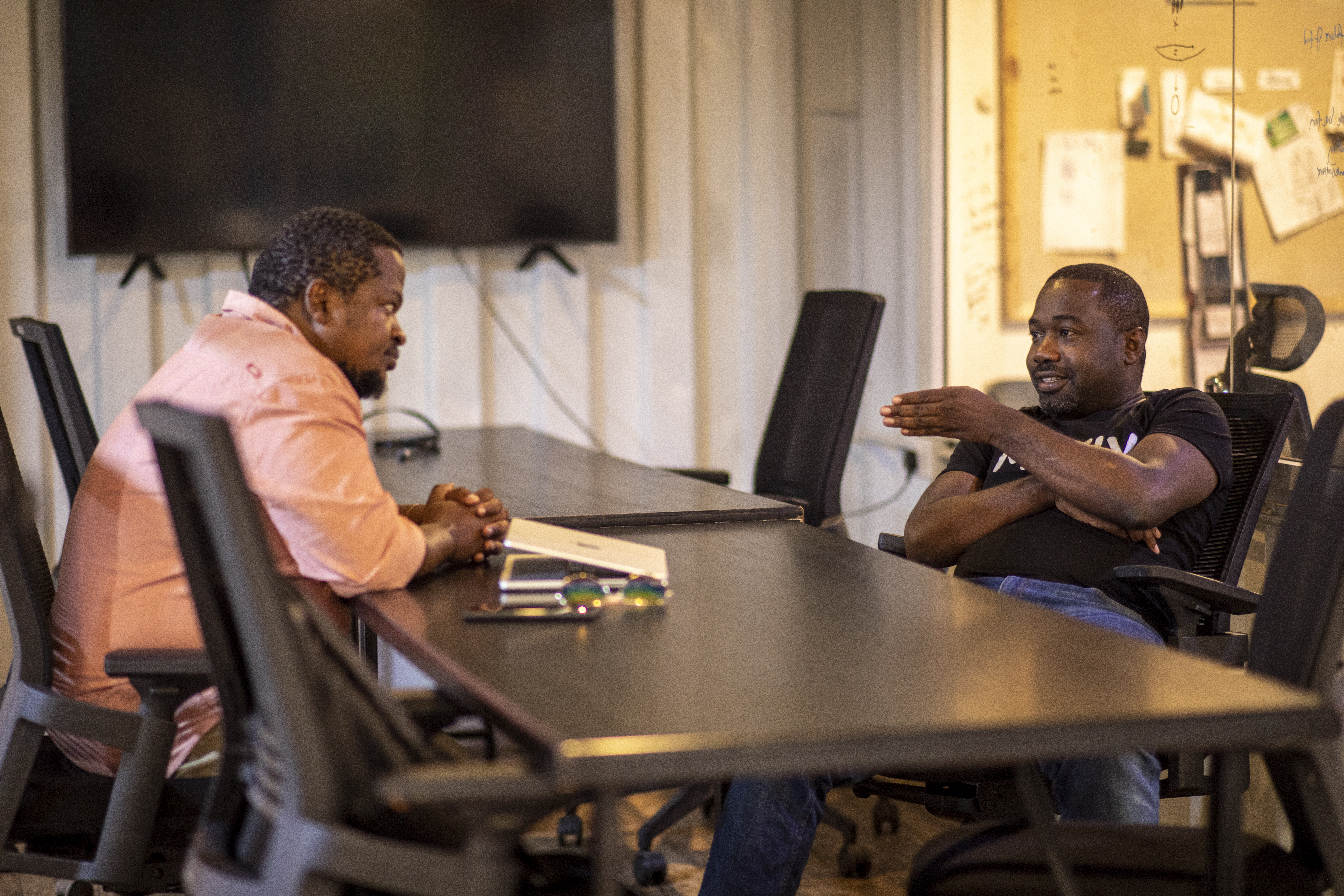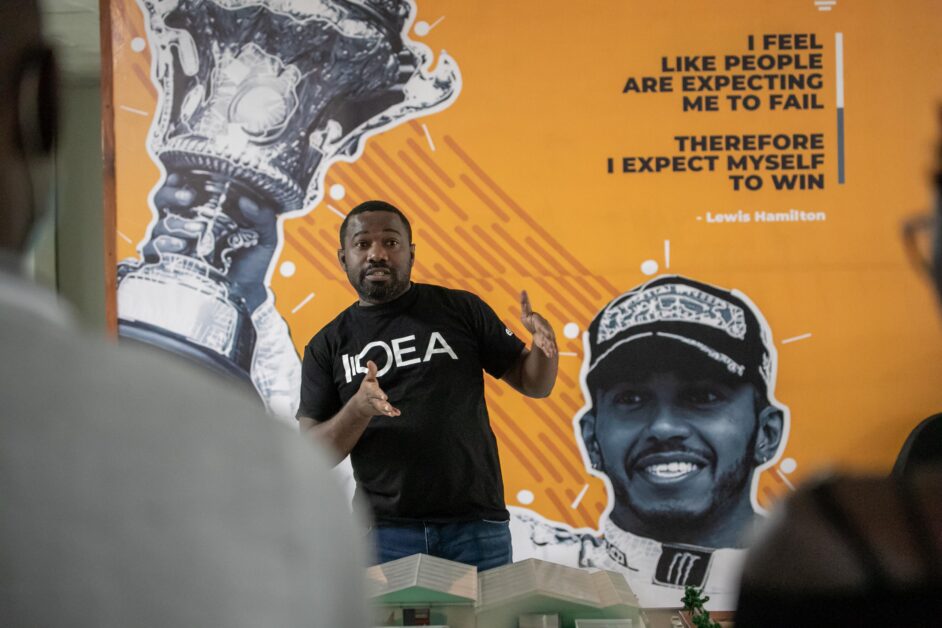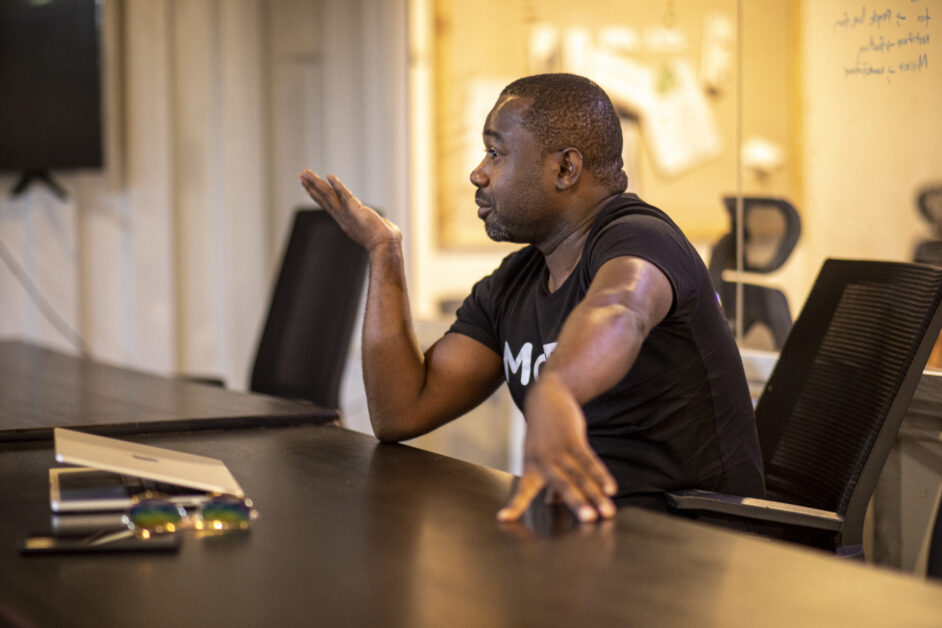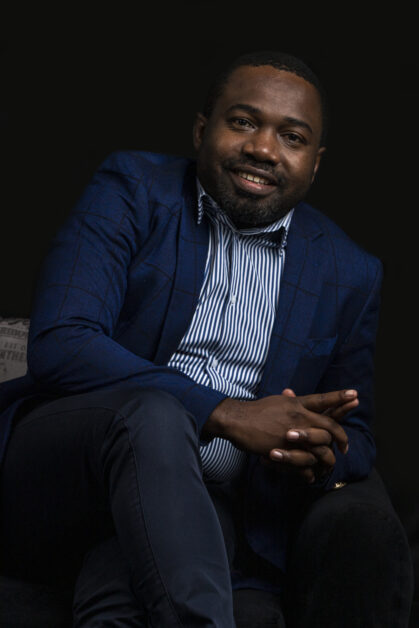In 2017 he went on to found The Innovation Village and in April 2020 started MoTIV. To mark his 6 years at The Innovation Village and three years at MoTIV, CEO East Africa Magazine’s Muhereza Kyamutetera, sat down CK Japheth for a tell-it-all interview. Looking back, the Edinburgh Business School (MBA, Strategic Planning) graduate says that even amidst the so frequent ’26-hour workdays’, so many successes and so many failures, that sometimes seem like “death by a thousand cuts” he is still “excited to be waking up every day to this role of building platforms that help other entrepreneurs start to grow and scale their own ventures”.
For starters, you are the founder of The Innovation Village and MoTIV. What is the thinking behind the two entities and what is the difference between the two?
When we built The Innovation Village, and through strong partnerships, we were able to build one of the biggest tech hubs in the country with branches in Gulu, Jinja, and Mbarara. Our philosophy is built around a community and we currently have 150,000 entrepreneurs in our community operating in about 12 different sectors. Entrepreneurs in all these locations wake up every morning knowing they have a partner or they have a place where they can go, where they will meet other people, where they will meet resources and expertise or an environment that can allow them to emerge in what they are trying to build. But one of the things that stood out for me when we were building The Innovation Village, I remember we went to Gulu, and the young people there who came to us were not into Technology, they were into break dancing and the creative arts and they wanted to use The Innovation Village to generate content and we found the same in Jinja as well as in Mbarara.
I was once asked by a young guy, where can they find a 3D printer where they can be able to prototype what they are trying to create. Now this is a USD5000 machine, and I kept asking myself how is it that in one of the most Entrepreneurial countries in the world, we don’t have even a single place with a 3D printer where someone can go and can prototype. But the more we looked at it, we know that technology is the in-thing, but the biggest percentage of the country is creatives⏤ fashion, entertainment, media etc. Although these have been on the rise, there is almost no deliberate support for this sector, yet they are the ones driving the economy and providing a significant part of employment.
So, MoTIV was born to build an ecosystem that can support the creative and cultural industry. So the Innovation Village does work on the tech side, while MoTIV does works in the creative industry- food, media, film, fashion, artists etc. Given we have a tech background, we bring the advantage of connecting the creative economy to technology through data and platforms. We also deploy our ecosystem approach to design initiatives that connect creatives to market, equipment, finance and to a community of other creatives to grow together.
Earlier on you talked about being motivated and building a platform that helps other Entrepreneurs to grow so that they can also bring other people on board. Six years down the road after the formation of The Innovation Village and three years after MOTIV, to what extent can you say your dream is coming alive?
I can’t believe it’s already six years of 26-hour days. If you ask me, what I could do differently or if I could go back to the beginning, I probably wouldn’t start⏤ you know it’s been death by a thousand cuts. But I am extremely proud of the journey we have moved.

To give you context, yes, we have built The Innovation Village, but more needs to be done to support entrepreneurs. Tech hubs thrive in a wider ecosystem where there is a supporting policy and regulatory framework, a friendly investment climate, and mentors who themselves are entrepreneurs. Yet, most of these supporting environments are either absent or not fully functional. So if you build a tech hub in such an environment, you can’t go far. Entrepreneurs and technopreneurs will continue to struggle if the foundation of those things is not being put in place.
That is why we made a deliberate decision to, along with the tech hub, convert ourselves by building a supporting ecosystem for our technopreneurs. These include policies- that is why we are for example leading conversations to have A Start-up Act, started the initial conversations to celebrate innovation in what was The Kampala Innovation Week, which was later taken up by other hubs to become Uganda Innovation Week and why we also launched the Kampala Angels Network, to begin building a pool of local investors to support local entrepreneurs. All of those things are supposed to be in place before you think of building a tech hub for an entrepreneur.
Looking at six years, we have put a lot of work into building the infrastructure around how tech hubs operate; around what powers entrepreneurs etc, so I am extremely pleased about that part. But of course, there are certain things we haven’t done or intend to do better. One of the key things that are most significant for me is the right kind of capital for entrepreneurs. We need to get into the market with the right type of capital that entrepreneurs need to start, grow and scale their ventures. At the moment, a lot of entrepreneurs will complain that they are over-trained but underfunded but most do not even know that the funding they are receiving is not even appropriate for their stage or organization. So the most important thing we are now trying to solve, is how to mobilise the right type of capital that entrepreneurs need, to be able to grow, expand, and be able to scale. If you don’t solve that, then almost everything else will not count.
What is this right kind of capital and where should it be coming from?
When you speak of capital, people expect startups to walk into a bank- but this is a no-starter. Startups don’t have business talking to a bank about funding, because that is not the form of capital that works for them. It is not even available in any case. The current structure is that the government and other partners are channelling resources for entrepreneurs through banks, but that is not the way it should be done. Banks are not built for that.

Then we also have an emerging dominance of grant capital that we see in the market, so we have ended up building a new crop of what we call “grantpreneurs”. People who are experts in moving from grant to grant, getting whatever little money they can from this donor to the next, without getting into the fundamentals of building a business for the market. As long as they can pitch to this donor, get the money and build, and then eventually after a year, you have commitments with three or four donors whose KPIs you have satisfied, but these KPIs are not necessarily for growing your business. So at the end of the day, you have not built the sustainable side of the business. What that does is that it drifts you away from building an entity that is going to make you attractive to a real-long term investor who is going to put money into your business to grow, hit monthly revenue targets, market acquisition, and expansion which is the very purpose you started a business in the first place. As someone used to grants, when you meet such an investor as an entrepreneur you are not even able to sustain a conversation because you will be talking about different things.
So a lot of our best entrepreneurs are dying at that hill of building for grants instead of building for markets where an investor will take interest and invest in you to expand what you are building for the long haul.
How do you think this can be fixed? At the end of the day, even the government doesn’t have enough resources. Should we perhaps be looking at other players such as NSSF who have a large pool of long-term capital?
I think we have one of the most pro-start-up governments in the region. When tech entrepreneurs complained some time back, the Ministry of ICT and National Guidance built a national hub that entrepreneurs are currently benefiting from. When again they complained after that, Government built a National ICT Support Program where they funded hundreds of entrepreneurs who apply for them. All those are great initiatives. We have been embraced by the Ministry of Trade and Industry, on The Startup Act process currently in the works. All those form a very firm foundation.
Policy is an important pillar as we solve for Capital and we are already picking up conversations on that. What a good policy and regulatory framework can do, are things like incentivizing bigger businesses to participate in enterprise development in a sustainable way in what I am now looking at as their Corporate Entrepreneurship Responsibility and not just CSR. So when you see a big bank or a big telecom, offering CSR, they should probably be doing much more sustainable partnerships with the community and enterprises within their value chains. It is easier too if there are incentivised to explore more sustainable ways to support startups. Eventually, that is how we give birth to initiatives like Corporate Venturing, which pushes startups even further.
I remember we were visited by the President of Mauritius, and she told me that in her country, 2% of profits from multinationals come back into enterprise development. So, we can through initiatives like that mobilise enough initial early-stage funding. It doesn’t have to come from the government but through policies like these, we can mobilise enough funding that can now begin going back to early-stage businesses in a sustainable way. Not CSR.

We have also seen structures like venture capital trusts or VCTs which are now a growing phenomenon and are tax-efficient closed-end schemes designed to provide capital for small expanding companies, and income (in the form of dividend distributions) and/or capital gains for investors. These were introduced by the UK government in the Finance Act to encourage investment into new UK businesses but we have seen similar structures set up close to home in Ghana too.
For example, if you look at Israel, it has 9 million people, but it gets more venture capital in a month than entire Africa in a full year. One of the early structures built by the Israel Government built was called Yozma. This was a fund structure that led to the birth of local venture capital funds in Israel as is known today. They created a professionally managed venture capital market in Israel by making equity investments in technology companies engaged in fields where Israel has demonstrated world leadership.
Initially, a government program aimed at prompting venture investments in Israel, their drop-down funds constitute the backbone of the Israeli venture market by recruiting senior managers, formulating business strategies, raising additional capital rounds and attracting strategic and financial investors.
All in all, I think a lot has been done and the conversations we are having with the government have been commendable. That is what innovation is.
In these six years or so, am sure there has been a lot of learning and unlearning. What are some of the key cross-cutting lessons for entrepreneurs, policymakers, government, and other stakeholder communities?
Several important lessons have shaped our story. Mostly for me is the fact that we must build the right policy, and regulatory framework that supports entrepreneurship, and ensure we have the right capital in place. We must also prioritise things that look simple like mentorship structures. The harder part is that those things are not going to build themselves. If we want to wake up one morning and there investors, chasing entrepreneurs, and not the other way around, someone must put this ecosystem up. The longer we take, to map and understand, what is needed to create this supportive environment, the longer it is going to take for us to build a successful mass of competitive startups. If there is no capital, then our entrepreneurs will not be able to scale or even start right. So we must come back to the table and curate the inputs for a successful ecosystem, including what is required to build it.
That said, another important lesson learned is the role of talent that we need to prioritize. It is probably more important than capital. We don’t have enough talent that is relevant for the building of technology ecosystems. A recent e-Conomy Africa Report released by Google and the International Finance Corporation (IFC), estimates that Africa’s Internet economy has the potential to reach 5.2% of the continent’s gross domestic product (GDP) by 2025, contributing nearly $180 billion to its economy. The projected potential contribution could reach $712 billion by 2050. Whereas Africa is home to 700,000 developers

Uganda had about 11,000 of those compared to Kenya’s 80,000 and Nigeria’s 120,000 developers. There is a direct correlation between the number of talented developers with the ability to build successful companies and the growth of the startup ecosystem. So if we don’t increase the number of technical talent in the market then we will not be able to build strong products companies that are building for markets across Africa. Even at The Innovation Village, we have struggled with talent that has experience in the start-up industry. Working in a startup is incredibly hard. You are plagued with no systems, limited experience, uncertainty, and chaos. Most people have ended up leaving what they term a toxic work environment, and yet that is a real-life stage typical of a fast-growing startup where your job is about managing chaos. It is a wild ride, where you are off the road on day 1. Building a startup means incredible swings with extreme deadlines, impossible tasks, relationship challenges, and money constraints that will be your way of life. It is not as great as it sounds. I tell people who are leaving The Innovation Village that they are lucky they have options because, I don’t think anyone wants a career where you are required to work harder than you ever have, are required to wear multiple hats and systems are a double-edged sword. Have more than you need and you stifle innovation, have none and nothing happens.
Borrowing experiences from other industries where this critical talent has been built, where is the problem? Is it in our schools; are we teaching our children the wrong things?
Yes. That’s the whole point because I can leave Bank A now and go to Bank B, and I will settle in immediately because of my shareable skills. But recruiting from Startup A to Startup B is hard because either is still struggling with these skills. Unfortunately, at schools, the innovation system is dead. Even simple things like decision-making, creativity, problem-solving, and delegation, are hardly taught.
It is also not any better especially since most of the large organisations here are multinationals and decisions are made and passed down from the headquarters. If someone spends 10 years in such a structured environment, where they have not been making decisions⏤ decisions, that have implications on cost, on people, on business, on direction, on vision, etc, when they join a start-up, where every decision they make could be your last, they can’t easily cope. In this our business, every decision you make, affects you, the business and your people immediately. But more importantly, it is the decisions you refuse and or fail to make that have even worse implications. But we are not taught any of that anywhere in school.
We must focus on nurturing that original creativity in our kids that is inborn⏤curiosity, problem-solving, accountability, the desire to keep learning etc and then also help them discover what makes them unique. We need to enable them to contribute to solving the problems that we have. We need to prioritise education focused on creativity, problem-solving, and decision-making, as well as Science, Technology, Engineering, And Math, including Computer Science—disciplines collectively known as STEM/CS., This is key to rebuilding our young people, our entrepreneurs, our economy and the country.
As a former teacher of entrepreneurship, I know that what we used to teach was theoretical. The practicality of education is something that needs to be emphasised. If you look at my vision for MoTIV, it is what I call a modern-day vocational institution. If you look at a typical everyday vocational institution, students go there to study, either electrical engineering or whatever it is and then they look for a job. But for me, the vocational institution that we are building is one that you go to, get the skill, then start a small business around the practical skills and the things that you love to do and then we provide the ecosystem to grow it to scale.
How do I get involved with MoTIV or The Innovation Village? Who comes here and how do they make it here?
You can join through our online application portal which helps us understand where you are and what you are trying to do, and what you are looking for. We also have a network of Youth Entrepreneur agents who reach out to entrepreneurs where we are not and those that are offline. We have a group of about 30, who engage entrepreneurs, understand what challenges they have and what businesses they are trying to build and how we can help them along their journey and then onboard them. They also help in understanding the sectors you are interested in, the challenges and aspirations and then match you to the different opportunities in the ecosystem.
It really must be a helluva job running all this and remaining sane. How do you manage to remain sane in the fast lane? How do you keep all this together and still keep moving?
True, it’s been a difficult period, but as a person, have an extremely supportive support framework around me. It is made up of my beautiful wife, (who keeps me in check) 2 daughters whose eyes and smiles melt me and a network of mentors and advisors whose shoulders I stand. I have also learned to live my life in phases. We have been at the foundation and discovery. It has been the most difficult, but I think we are beginning to get out of it. I am excited to explore what getting out of this phase looks like into the distribution stage and hopefully into the democratization stage. It has been challenging, we failed more than we succeeded but I think this was necessary for the foundation we have now built.

So, a day in my life starts at 4:00 am and ends at midnight. It has been claimed that if you discover your passion, you will never have to work another day for the rest of your life, but I think they are wrong. If you discover your passion, you have to work for the rest of your life. The good thing though, is that although most times it will be hard, it won’t feel like a job.
Are there some people who have gone through the Village or MOTIV, some key case studies you are proud of?
I am extremely proud of the entrepreneurs in our spaces, those who have grown through us, and those who have benefited from our community. As I said earlier, we have a community of about 150,000 entrepreneurs across 12 sectors at MoTIV and The Innovation Village. At MoTIV we work with guys like the Vodo Arts Society who are driven by their craft. It is very hard for me to mention one entity or a few because my mandate is to build a community of millions of entrepreneurs. Many of them have come through us and started their business and we are supporting them on their growth journey through such initiatives as Tubayo Market place which has grown to be the biggest marketplace where over 300 other businesses meet and cross-sell. That is one of my proudest moments because through supporting Tubayo, we have managed to support many more others to commercialise their trade. We have also supported other initiatives like Xente, in the tech space, who have now grown and are supporting other businesses and Zofi Cash that I am extremely proud of.
Is there anything else I have left out that you need to highlight?
I am extremely grateful to our teams those in the past and those currently working with us. None of what we talk about would even be possible without them. Also, so many partners have believed in us even when there was no reason to believe. They have made our work possible. The future of our ecosystem now depends on our ability to put in place a sustained holistic approach to supporting entrepreneurs. We need to look at policy and regulatory environment, skilling (talent), relevant capital, advocacy⏤ a full suite of interventions that will create sustainable enterprises; that is the future this generation which is the youngest in the world deserves.
